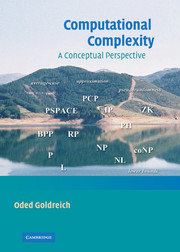Book contents
- Frontmatter
- Contents
- List of Figures
- Preface
- Organization and Chapter Summaries
- Acknowledgments
- 1 Introduction and Preliminaries
- 2 P, NP, and NP-Completeness
- 3 Variations on P and NP
- 4 More Resources, More Power?
- 5 Space Complexity
- 6 Randomness and Counting
- 7 The Bright Side of Hardness
- 8 Pseudorandom Generators
- 9 Probabilistic Proof Systems
- 10 Relaxing the Requirements
- Epilogue
- Appendix A Glossary of Complexity Classes
- Appendix B On the Quest for Lower Bounds
- Appendix C On the Foundations of Modern Cryptography
- Appendix D Probabilistic Preliminaries and Advanced Topics in Randomization
- Appendix E Explicit Constructions
- Appendix F Some Omitted Proofs
- Appendix G Some Computational Problems
- Bibliography
- Index
Appendix E - Explicit Constructions
Published online by Cambridge University Press: 05 June 2012
- Frontmatter
- Contents
- List of Figures
- Preface
- Organization and Chapter Summaries
- Acknowledgments
- 1 Introduction and Preliminaries
- 2 P, NP, and NP-Completeness
- 3 Variations on P and NP
- 4 More Resources, More Power?
- 5 Space Complexity
- 6 Randomness and Counting
- 7 The Bright Side of Hardness
- 8 Pseudorandom Generators
- 9 Probabilistic Proof Systems
- 10 Relaxing the Requirements
- Epilogue
- Appendix A Glossary of Complexity Classes
- Appendix B On the Quest for Lower Bounds
- Appendix C On the Foundations of Modern Cryptography
- Appendix D Probabilistic Preliminaries and Advanced Topics in Randomization
- Appendix E Explicit Constructions
- Appendix F Some Omitted Proofs
- Appendix G Some Computational Problems
- Bibliography
- Index
Summary
It is easier for a camel to go through the eye of a needle, than for a rich man to enter into the kingdom of God.
Matthew, 19:24.Complexity Theory provides a clear definition of the intuitive notion of an explicit construction. Furthermore, it also suggests a hierarchy of different levels of explicitness, referring to the ease of constructing the said object.
The basic levels of explicitness are provided by considering the complexity of fully constructing the object (e.g., the time it takes to print the truth table of a finite function). In this context, explicitness often means outputting a full description of the object in time that is polynomial in the length of that description. Stronger levels of explicitness emerge when considering the complexity of answering natural queries regarding the object (e.g., the time it takes to evaluate a fixed function at a given input). In this context, (strong) explicitness often means answering such queries in polynomial time.
The aforementioned themes are demonstrated in our brief review of explicit constructions of error-correcting codes and expander graphs. These constructions are, in turn, used in various parts of the main text.
Summary: This appendix provides a brief overview of aspects of coding theory and expander graphs that are most relevant to Complexity Theory. Starting with coding theory, we review several popular constructions of error-correcting codes, culminating in the construction of a “good” binary code (i.e., a code that achieves constant relative distance and constant rate). […]
Information
- Type
- Chapter
- Information
- Computational ComplexityA Conceptual Perspective, pp. 545 - 565Publisher: Cambridge University PressPrint publication year: 2008
